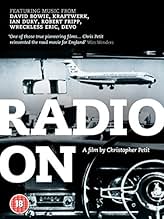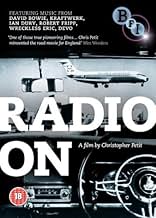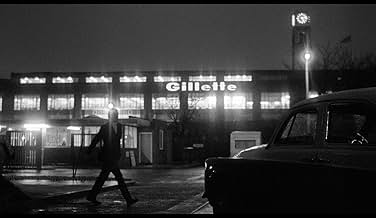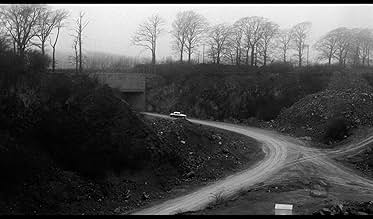Radio On
- 1979
- 1 h 44 min
AVALIAÇÃO DA IMDb
6,5/10
1,3 mil
SUA AVALIAÇÃO
Adicionar um enredo no seu idiomaIn 1970s Britain, a man drives from London to Bristol to investigate his brother's death, and the purpose of his trip is offset by his encounters with a series of odd people.In 1970s Britain, a man drives from London to Bristol to investigate his brother's death, and the purpose of his trip is offset by his encounters with a series of odd people.In 1970s Britain, a man drives from London to Bristol to investigate his brother's death, and the purpose of his trip is offset by his encounters with a series of odd people.
- Direção
- Roteiristas
- Artistas
- Prêmios
- 1 vitória e 1 indicação no total
Avaliações em destaque
This is one of Britain's forgotten films (only 4 IMDb reviews at the time of writing these comments, nearly 30 years after it was made). The first film by the then film critic Chris Petit, made in 1979, it conveys accurately the bleakness - and the depressing music - of the late 1970s.
The plot is minimal. A morose, alienated man learns of his brother's death and travels from London to Bristol to find out more. The 'quest' is half-hearted and his encounters on the road and in Bristol are unsatisfactory and unfulfilled. Nothing seems worthwhile following through. whether it is his investigation into his brother's life and death, his encounter with a German woman or even his relationship with his antique Rover car.
The B/W photography is splendid, matching perfectly the mood of alienation and the bleak picture of a part of England in the winter of 1979. The influence of Wim Wenders (the producer) is clear but it is very distinctively an English film, worth seeing and listening to if only to remind us of the dismal '70s - but having seen it, that's enough. Interesting, but not a classic.
The plot is minimal. A morose, alienated man learns of his brother's death and travels from London to Bristol to find out more. The 'quest' is half-hearted and his encounters on the road and in Bristol are unsatisfactory and unfulfilled. Nothing seems worthwhile following through. whether it is his investigation into his brother's life and death, his encounter with a German woman or even his relationship with his antique Rover car.
The B/W photography is splendid, matching perfectly the mood of alienation and the bleak picture of a part of England in the winter of 1979. The influence of Wim Wenders (the producer) is clear but it is very distinctively an English film, worth seeing and listening to if only to remind us of the dismal '70s - but having seen it, that's enough. Interesting, but not a classic.
Filmed in black and white with some great imagery; I love how this film looks with its art-house styling. There is a pretty good soundtrack with songs from the likes of David Bowie, Ian Dury, Kraftwerk and Devo
amongst others. All the performances were good but all delivered in a very 'matter of fact' manner. David Beames took centre stage as Robert with Lisa Kreuzer playing Ingrid. Sandy Ratcliff was Kathy and Andrew Byatt the Deserter but (for me) the star turn was a brief cameo from Sting as the Eddie Cochrane loving petrol pump attendant.
I must admit I was somewhat disappointed by this film. I expected a little more focus on the music for one thing and the fact that everyone in Bristol seemed to speak with a London accent didn't help! It has a very slow pace which I was prepared to accept as long as something happened. Sadly, apart from one bright sequence featuring Sting, not a lot seemed to. There are also sequences where the majority of the dialogue is in German, with no subtitles; very odd! I will give the filmmakers credit for some excellent imagery showing just how bleak an English winter can be (even in the South). Over all I'd say one for lovers of art-house films for them, Recommended for the general cinebuff maybe not.
My Score 6.4/10
IMDb Score: 6.3/10 (based on 296 votes at the time of going to press).
MetaScore: NO DATA: (Based on 0 critic reviews provided by Metacritic.com at the time of going to press).
Rotten Tomatoes 'Tomatometer' Score: NO DATA (based on 0 reviews counted at the time of going to press).
Rotten Tomatoes 'Audience' Score: 12/100 'Want to See' (based on 625 user ratings counted at the time of going to press).
You can find an expanded version of this review on my blog: Thoughts of a SteelMonster.
I must admit I was somewhat disappointed by this film. I expected a little more focus on the music for one thing and the fact that everyone in Bristol seemed to speak with a London accent didn't help! It has a very slow pace which I was prepared to accept as long as something happened. Sadly, apart from one bright sequence featuring Sting, not a lot seemed to. There are also sequences where the majority of the dialogue is in German, with no subtitles; very odd! I will give the filmmakers credit for some excellent imagery showing just how bleak an English winter can be (even in the South). Over all I'd say one for lovers of art-house films for them, Recommended for the general cinebuff maybe not.
My Score 6.4/10
IMDb Score: 6.3/10 (based on 296 votes at the time of going to press).
MetaScore: NO DATA: (Based on 0 critic reviews provided by Metacritic.com at the time of going to press).
Rotten Tomatoes 'Tomatometer' Score: NO DATA (based on 0 reviews counted at the time of going to press).
Rotten Tomatoes 'Audience' Score: 12/100 'Want to See' (based on 625 user ratings counted at the time of going to press).
You can find an expanded version of this review on my blog: Thoughts of a SteelMonster.
A radio DJ drives from London to Bristol to investigate the death of his brother. Along the way he encounters some odd people and listens to some pretty cool music. Former film critic Christopher Petit crafts a very deliberate homage to the early films of Wim Wenders (who was a producer), even using Wenders's cinematographer and actress Lisa Kreuzer (who may even be reprising her role from "Alice in the Cities"). This is a very slow and uneventful film, but if you appreciate Wenders's existential road films, you should love this one. Sting's debut role here is the best role he ever had as a fanatical Eddie Cochran fan. David Bowie, Kraftwerk, Ian Dury and Wreckless Eric are all featured on the soundtrack.
The road movie is among my favorite genres, and "Radio On" ranks with the best of them. Co-produced by Wim Wenders, the master of the existential road movie (whose production company is called "Road Movies," no less), it was made in 1979 by Christopher Petit, who had been a film critic for London's "Time Out" and received funding from Wenders and the British Film Institute to make this film. One very clearly sees an admiration here for Wenders' road trilogy, particularly "Kings of the Road," but "Radio On" extracts the essence of Wenders' style and the soul of the road movie and forms a sort of concentrate from it. This is a meditation *on* the road movie, but on lots of other things, too.
In a film with very long shots and many lonesome scenes with no dialogue, nothing feels superfluous. Lengthy, lingering shots from behind the driver's seat of a moving car with music from Kraftwerk's "Radio-Activity" could very well come across as empty, but in this movie, they don't. Each shot is given ample time to sink in, and they do. Petit has made a movie, rich in its sparseness, that depicts alienation and inward-seeking as effectively as any Wenders film, and like Wenders, there are echoes of Edward Hopper's paintings here in the evening streets lit by streetlights, and in the beautiful moment where we see two characters, British man and German woman, each standing behind separate hotel room windows, staring out pensively as we pass by from a motorway bridge.
The man in the window is Robert, the film's central character, and he is traveling from Camden to Bristol to seek information about the death of his brother. That his name is Robert will likely slip the viewer's mind, as what's important about "Radio On" and the road movies of Wim Wenders is that the central characters are not too sharply drawn, and only a vague set of circumstances are established to give their journey the semblance of purpose. This way, the characters are ciphers, blank slates, and we take this journey with them by inhabiting them, by projecting our own sensibilities onto them, and to that extent, films like "Kings of the Road," "Radio On," and Wenders' later and similar "Until the End of the World" are as purging as a road trip itself.
All of the characters in "Radio On" look like they are brooding, but they don't talk about why, they simply brood and they keep moving while doing so.
Angst and alienation are both factors, but so is the fact that the world is changing. From a small, wintry spot on the globe, change is just around the corner and the characters feel it in their bones, if not yet in their heads.
The energy of the music of David Bowie, Wreckless Eric, Devo and others penetrates the meditative pace and makes these imminent changes palpable in the film's ambiance, or more accurately, in its aura. The movie's calm is an eerie and temporary one, like when the shoreline recedes prior to a tidal wave.
As the title would suggest, the music is one of the principal elements here.
I will indelibly associate Bowie's "Heroes" and Wreckless Eric's "Whole Wide World" with this film. Here, they are like the sun of a new decade rising to melt the snow of the 1970s. Or like a curtain call for an age.
And there is genuine poetry in the dialogue.
The German tourist explains to Robert that her friend hates men. Robert observes, "There's no word for that in English. The only word is for a man who hates women," and we understand that there is sadness in this fact, even if we can't articulate why.
The movie is beautifully conceived and structured, and it is structured both loosely and mindfully. It moves slowly, but it's spontaneous. Sting appears briefly as a filling station attendant, in a wonderful scene where he talks about the death of Eddie Cochran, strums his guitar, and sings "Three Steps to Heaven" from the back of his camper. The film ends as we hear Kraftwerk's "Ohm Sweet Ohm" beaming out from a car radio on the edge of a cliff, and home sweet home is precisely nowhere. This movie is quiet, slow, low-key, but it gets under the skin and is ultimately quite stirring.
In a film with very long shots and many lonesome scenes with no dialogue, nothing feels superfluous. Lengthy, lingering shots from behind the driver's seat of a moving car with music from Kraftwerk's "Radio-Activity" could very well come across as empty, but in this movie, they don't. Each shot is given ample time to sink in, and they do. Petit has made a movie, rich in its sparseness, that depicts alienation and inward-seeking as effectively as any Wenders film, and like Wenders, there are echoes of Edward Hopper's paintings here in the evening streets lit by streetlights, and in the beautiful moment where we see two characters, British man and German woman, each standing behind separate hotel room windows, staring out pensively as we pass by from a motorway bridge.
The man in the window is Robert, the film's central character, and he is traveling from Camden to Bristol to seek information about the death of his brother. That his name is Robert will likely slip the viewer's mind, as what's important about "Radio On" and the road movies of Wim Wenders is that the central characters are not too sharply drawn, and only a vague set of circumstances are established to give their journey the semblance of purpose. This way, the characters are ciphers, blank slates, and we take this journey with them by inhabiting them, by projecting our own sensibilities onto them, and to that extent, films like "Kings of the Road," "Radio On," and Wenders' later and similar "Until the End of the World" are as purging as a road trip itself.
All of the characters in "Radio On" look like they are brooding, but they don't talk about why, they simply brood and they keep moving while doing so.
Angst and alienation are both factors, but so is the fact that the world is changing. From a small, wintry spot on the globe, change is just around the corner and the characters feel it in their bones, if not yet in their heads.
The energy of the music of David Bowie, Wreckless Eric, Devo and others penetrates the meditative pace and makes these imminent changes palpable in the film's ambiance, or more accurately, in its aura. The movie's calm is an eerie and temporary one, like when the shoreline recedes prior to a tidal wave.
As the title would suggest, the music is one of the principal elements here.
I will indelibly associate Bowie's "Heroes" and Wreckless Eric's "Whole Wide World" with this film. Here, they are like the sun of a new decade rising to melt the snow of the 1970s. Or like a curtain call for an age.
And there is genuine poetry in the dialogue.
The German tourist explains to Robert that her friend hates men. Robert observes, "There's no word for that in English. The only word is for a man who hates women," and we understand that there is sadness in this fact, even if we can't articulate why.
The movie is beautifully conceived and structured, and it is structured both loosely and mindfully. It moves slowly, but it's spontaneous. Sting appears briefly as a filling station attendant, in a wonderful scene where he talks about the death of Eddie Cochran, strums his guitar, and sings "Three Steps to Heaven" from the back of his camper. The film ends as we hear Kraftwerk's "Ohm Sweet Ohm" beaming out from a car radio on the edge of a cliff, and home sweet home is precisely nowhere. This movie is quiet, slow, low-key, but it gets under the skin and is ultimately quite stirring.
came across this database entry by accident. saw the movie 25 years ago and still can find its traces in my memory - amongst these the strongest when Robert and a hitchhiker drive along a forest of power line pylons and find them awful. Robert says something like "years from now when only a few of them are left we might say they're beautiful" (sorry, a 25 year old memory is not the best base for correct quoting) Christopher Petits influences of the early Wim Wenders road movies can be traced down best in " I'm Laufe der Zeit (Kings of the Road) " from 1976 - its in b/ w as well. But to me there is as well a link to Jarmush's " Stranger than Paradise " from 1984 (more acting and dialogs but the same slow glide thru scenic black& white landscapes)
Você sabia?
- CuriosidadesIn Britain, this film had a limited release on the art-house circuit in 1980 in a double-bill with a famous film made half-a-century earlier, Luis Bunuel's "L'Age D'Or", which had only recently come off the censor's banned list. One critic remarked that this double-billing meant that he had had both his best and his worst cinema-going experience of 1980 on the same evening.
- ConexõesFeatured in Radio On Remix (1998)
Principais escolhas
Faça login para avaliar e ver a lista de recomendações personalizadas
- How long is Radio On?Fornecido pela Alexa
Detalhes
- Data de lançamento
- Países de origem
- Idiomas
- Também conhecido como
- Radio on
- Locações de filme
- M4, Londres, Inglaterra, Reino Unido(6 High-rise Flats on Green Dragon Lane)
- Empresas de produção
- Consulte mais créditos da empresa na IMDbPro
- Tempo de duração
- 1 h 44 min(104 min)
- Cor
- Mixagem de som
- Proporção
- 1.85 : 1
Contribua para esta página
Sugerir uma alteração ou adicionar conteúdo ausente












